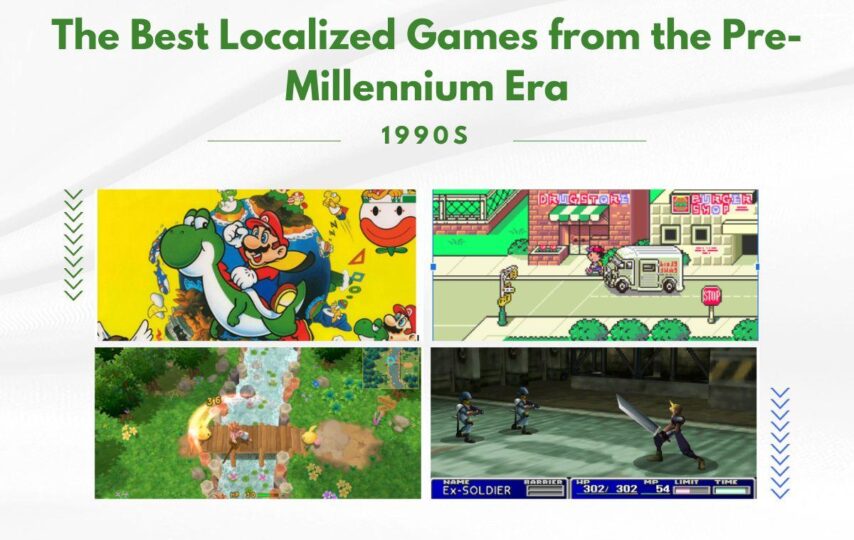The 90s is a special era, one remembered by all fondly. It was also an important time in video game global expansion. Developers had just begun to understand how localization can help them expand to global markets. Many classic titles at the time underwent localization efforts in hopes of creating international communities.
And guess what? It worked! There are countless games from the 90s that are still household names and still played by many. Today, you can find most of the games I am about to mention on your mobile devices. Fans and game community members are still localizing many titles to this day.
Video game translation services started gaining traction during the early 90s. While today localization efforts are necessary steps in developing a game, especially if it is a AAA game. But this was not always the case.
Some of the best-localized games from the 1990s include:
Super Mario World
I think we have all played a Super Mario game in our life. The goal is usually the same, we must navigate the cloud mushroom land of Super Mario. Go through obstacles and creatures to rescue the princess Toadstool. During the game, you can collect coins and level up by feeding on mushrooms. Moreover, you can also ride dinosaur-like creatures to travel faster and receive less damage. The game has been localized for over 30 different languages, and surprisingly, fans are still localizing and modding the game to this day. You can say the game has a cult-like following.
Secrets of Mana
Square Enix created the game and officially released it in Japan under the name Seiken Densetsu. However, it was released in the international community under the name Secrets of Mana. When it comes to localization the developers and translation agency went the extra mile. The dialogue, personality, and humor are all localized to suit the Western audience. Even the game soundtrack is altered to enhance engagement. All such localization efforts have worked wonders.
EarthBound
Some say the game is a flop, while others say it is a success. All I know is that the original Nintendo cartridge game is way too expensive to suggest that it is a flop. Obviously, the demand for the game is high. When it was released in Japan, EarthBound was named Mother 2, but it was released in Western markets under the name EarthBound. The localization strategy is clear to see with puns, jokes, dialogues, and music all changed to suit Western demographic needs. Even the in-game pop culture is localized.
- Final Fantasy VII
The entire Final Fantasy series has a cult-like following. However, this phenomenon only exists because of the game developers’ localization strategy. The game is so popular that fans keep making modern versions of the game by enhancing graphics and localizing the content. This RPG when originally released broke sales records both in Japan and the Western markets. The localization team translated a large portion of the script, and their efforts were appreciated by all communities. People still play the game with the same excitement they had in the 90s.
- Metal Gear Solid
Developed by the very popular Konami studio. The entire Metal Gear series has a crazy fan base, with literature and movies taking inspiration from the original game. Thanks to the epic game translation services, the character Solid Snake is an iconic figure in the gaming world. The developers used voiceovers from famous Hollywood actors. This helped increase the cinematic effect from the game.
- Resident Evil
The game developed by Capcom surprised everyone with its brilliant graphics and gameplay. For that time, the game was truly impressive and immersive. This survivor horror game terrified people across the globe. Originally released in Japan, the localized version quickly grasped international markets at rapid speed. Localization included menu changes, dialogues, voiceovers, and more. Fans have revamped the original game for PlayStation 5 using the Unreal engine.
Street Fighter
I think everyone born in the 1980s-1990s has played one of the Street Fighter games. The game is and was a cultural phenomenon. Back when the Arcade scene was going strong, players enjoyed this game in arcades across the world. The ever-popular game characters Chun-Li and Ryu still inspire new game and movie characters. Street Fighter, like most of the best games in the 1990s, was originally released in Japan. However, after rigorously localizing the game’s user interface and subbed content, the developers released it on the global stage. They also performed voiceovers, but since spoken words were few and far between, they kept them very minimal.
Conclusion
These are just a handful of examples of popular games localized from the 1990s. You can find many more and you can play most of these games on your mobile devices. Such games show us the power of localization. The only reason that old games live on in our memories and hard drives is because of good localization strategies. If game developers want to market their games to global audiences and increase profits, localization is essential. It not only increases your target audience but also helps you create long-lasting communities. Through this, you can get more sponsors, make money from merchandise, and more.


